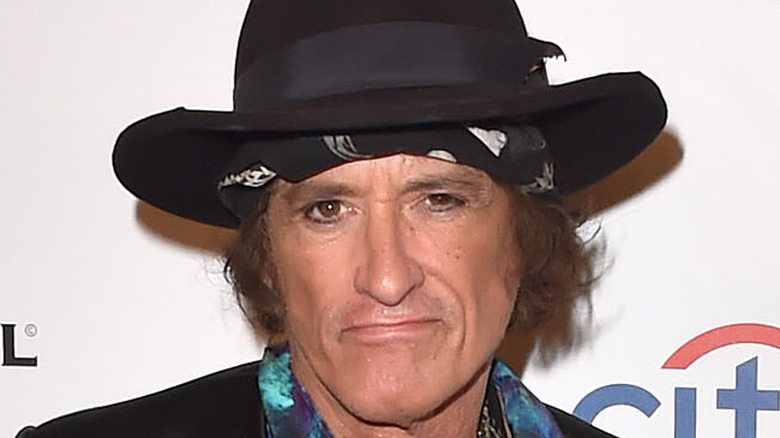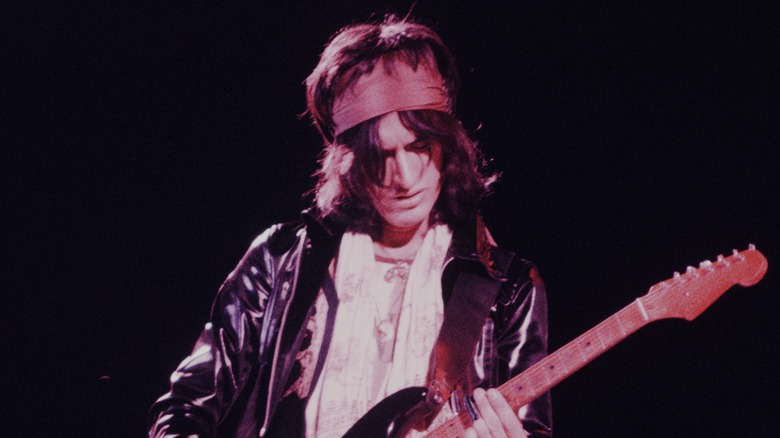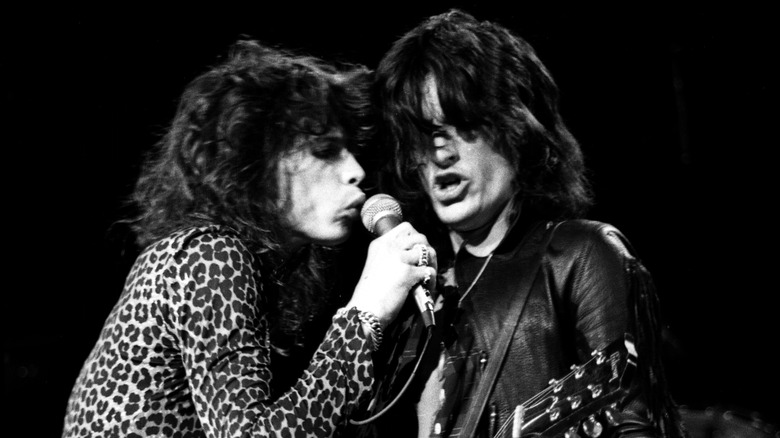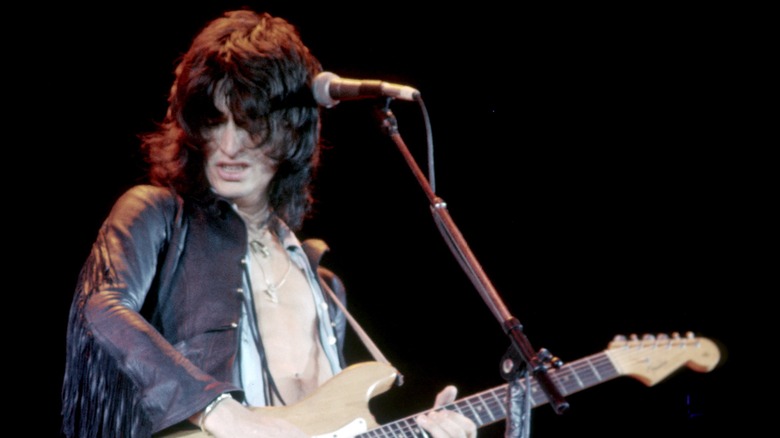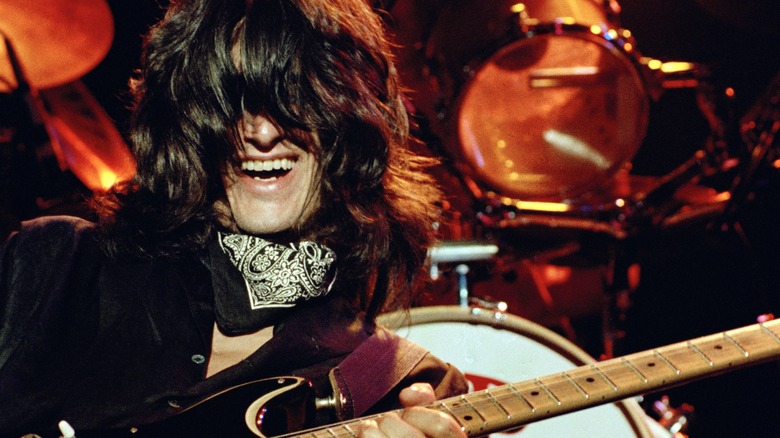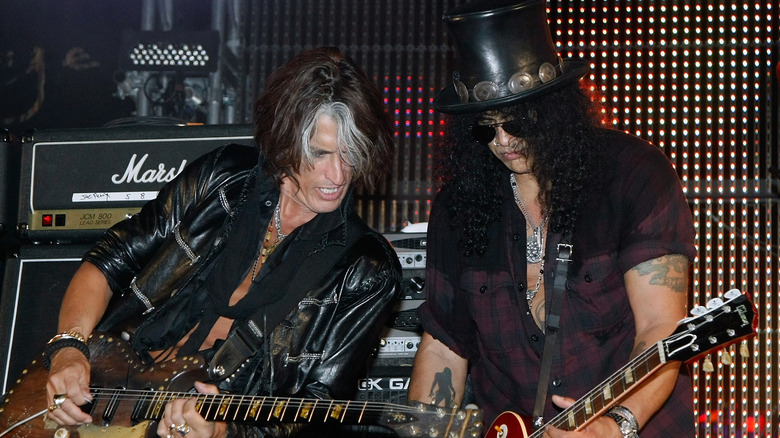The Untold Truth Of Joe Perry
When people talk about Aerosmith, the first name that pops in their mind is likely that of their longtime frontman, Steven Tyler. But it cannot be denied that the band wouldn't have had all that success and wouldn't have become so influential if it wasn't for the talent of their lead guitarist, Joe Perry. Their creative and commercial downturn coincided with Perry's exit from the band in 1979, and it was only after he returned five years later that Aerosmith got back on the road to relevance. It may be Tyler's voice that you hear on each and every one of Aerosmith's biggest hits, but Perry's skillful guitar licks and solos have always been just as important to the band's signature sound.
As a member of one of rock music's longest-running and most successful bands, Perry has practically seen and experienced it all. These include his well-documented battles with substance abuse as one-half of the "Toxic Twins" with Tyler (both have long since gotten sober), as well as the drama between these two friends and bandmates that has resurfaced multiple times in Aerosmith's five decades together. However, as is usually the case with veteran musicians who have been playing in bands for well over half their life, there are many details about the guitarist's life that may come as a surprise to the average fan. So with that in mind, here's the untold truth of Joe Perry.
He originally wanted to become a marine biologist
It's not all that unusual for musicians to be less than academically inclined while growing up; while the future doctors, lawyers, and business moguls regularly make the honor roll, the future rock stars often come home with C's and D's on their report cards, and maybe a few F's here and there. That's basically Joe Perry's academic life in a nutshell, but his poor grades were particularly concerning because his original ambition was to become a marine biologist.
Speaking to the Burlington Free Press, Perry recalled that when he was in his sophomore or junior year in high school, his parents had him transfer to Vermont Academy — then an all-boys prep school — in hopes that the move would help him improve his grades. Instead, he was exposed to the music of future rock legends such as the Yardbirds, The Who, and Jimi Hendrix, making him more committed than ever to honing his skills as a guitarist.
Perry dropped out of Vermont Academy in 1969, just months shy of graduation, partly because he was being badgered by the school's administration to cut his hair — a true sign of the times. His continued lack of academic success, he explained, was the other reason. "I wasn't getting any better at it, at getting to where I could get a good grade on the test and all that stuff," the guitarist admitted. "It was pretty dismal. But I tried. I wanted to make my parents happy."
The dark story behind the first Aerosmith song with Perry on lead vocals
Although he's primarily known as Aerosmith's lead guitarist, Joe Perry has shared lead vocal duties on occasion with Steven Tyler, with the first instance taking place on the song "Combination," from the 1976 album "Rocks." As quoted by Ultimate Classic Rock, Perry wrote in his autobiography, "Rocks: My Life in and Out of Aerosmith," that the lead vocal role was "Steven's jealously guarded territory," and he knew he wasn't going to sound so good when compared to someone of Tyler's caliber. That didn't deter him from singing lead vocals on a song he wrote on his own, though he had to compromise and share the mic with his fellow Toxic Twin.
"Beyond that, anytime the spotlight shone on me, I detected a bit of jealousy from the other guys," he continued. "After a while, though, the band came around and supported me, as long as I sang the song as a semi-duet with Steven."
So what was "Combination" about anyway? As explained by Songfacts, the tune focuses on how Perry had become a rich man thanks to Aerosmith's commercial success, thus allowing him to buy designer clothes while also being able to afford copious amounts of heroin and cocaine. One set of lyrics particularly highlights the lethal "combination" Perry had written about in the song — "Walkin' on Gucci / Wearin' Yves Saint Laurent / Barely stay on 'cause I'm so god d*** gaunt."
The real reason why Joe Perry quit -- or was fired from -- Aerosmith in 1979
The events of July 28, 1979, are a case of he-said-she-said for the members of Aerosmith, but one thing has always been certain — that was the day when Joe Perry left the group. Per Ultimate Classic Rock, it was right after their performance at the Cleveland Municipal Stadium on that day that Perry either quit the band or got sacked — if you ask him, he told his bandmates that he was voluntarily leaving, but Steven Tyler recalled in his autobiography, "Does the Noise in My Head Bother You?", that he drunkenly fired Perry.
Apparently, the impetus for Tyler's decision to fire Perry — if he did indeed fire him — was a backstage fight between the guitarist's then-wife, Elyssa, and bassist Tom Hamilton's wife, Terri. "I got into it with Joe," Tyler wrote in his memoir. "'Man, can't you come over here and control your woman?' ... Joe was acting like it was Elyssa's right to do what she did, and he's saying as much while Terri's still in the room. Didn't care."
Meanwhile, Perry seemed to play it safe while he was promoting his solo band's first album, not mentioning any details about the aforementioned squabble. However, he did claim that he left because he was frustrated with how long it was taking for Aerosmith to complete their 1979 album "Night in the Ruts" and how the band had to "go back and do the same old songs" in concert.
The Joe Perry Project failed to make a dent commercially
Following Perry's departure from Aerosmith, the axeman was free to do his own thing, and it was just one year later when the Joe Perry Project released their debut album, "Let the Music Do the Talking." As noted in AllMusic's review of the album, the record "recalled the brash and trashy appeal of early Aerosmith," with its title track centering on the "in-press bickering" between Perry and his former bandmates. It was a modest success at best on the album charts, peaking at No. 47 on the Billboard 200 in May 1980.
"Let the Music Do the Talking" was followed up one year later by "I've Got the Rock and Rolls Again," and in 1983, the Joe Perry Project released their third album, "Once a Rocker, Always a Rocker." The former did substantially worse than the debut release as it only got as high as No. 100 on the Billboard 200, while the latter didn't even get to chart. Diminishing commercial returns, however, were just one of the problems the Joe Perry Project faced.
As pointed out by Rock Music Star, the band changed frontmen with each album they released — Ralph Morman sang lead vocals on the debut record, Charlie Farren took his place on "I've Got The Rock and Rolls Again," and Cowboy Mach Bell handled frontman duties on "Once a Rocker." That's never a good sign for any band, especially if it's led by — and bears the name of — someone with Perry's track record and public recognition.
Slash ended up with Perry's '59 Les Paul ... then gifted it back years later
Having to sell a beloved possession when strapped for cash can be a heartbreaking decision for some, but for Joe Perry, his finances were in such a mess in the early 1980s that he sold his 1959 Gibson Les Paul, among other guitars he owned, without "[thinking] much about it," as he told Conan O'Brien in 2014 (via Boston Magazine). Several years later, Perry was back in Aerosmith and money was no longer a problem. But just as he was hoping to buy back the old guitars he had once sold to put food on the table, he discovered that the vintage instrument was in the possession of a young guitar hero who grew up as a fan of Aerosmith — Slash of Guns 'n' Roses.
For quite a while, Perry tried to convince Slash to sell the guitar back to him but had failed each time; at some point, the Aerosmith guitarist waved the white flag and allowed the younger axeman to keep the instrument. However, Perry got a huge surprise on his 50th birthday in 2000, when Slash's guitar tech walked up to him as he was sitting in with Cheap Trick, presenting him with that '59 Les Paul. "Slash gave it to me," he told O'Brien. "His heart is so big I don't know how it fits in his chest."
